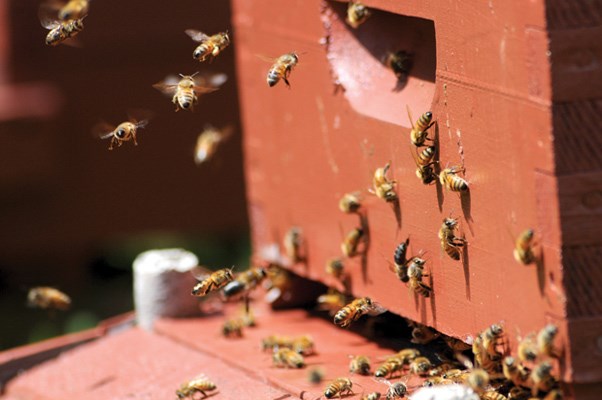THE District of North Vancouver should not try to repel the intrusion of invasive plant species with chemically based herbicides, according to at least one beekeeper.
Fiona Gold was tending to two hives on St. Andrews Avenue near East Kings Road recently when she noticed a sign alerting residents that glyphosate had been sprayed approximately 40 feet from the apiary.
"I think people should just be aware that the district is spraying this stuff and it is toxic," Gold said.
The object of the spray was a crop of Japanese knotweed, an invasive species that has been known to sprout up through roads and retaining walls.
Killing the plants quickly is critical, according to District of North Vancouver environmental sustainability section manager Julie Pavey.
"When you've got stems of knotweed you've displaced your native vegetation," she said.
Gold's bees appeared to move slightly differently after the spraying, but were otherwise OK, she said.
"They're alive, thank God." Glyphosate is the active ingredient in popular weed killers, but it may be harmful to more than just plants, according to Gold.
Researchers from the Chulabhorn Graduate Institute in Thailand recently published findings linking pure glyphosate to breast cancer. Their research suggests glyphosate may disrupt natural hormone production.
While Gold steered clear of the area, she wondered if the sprayed site could be a hazard for small children, residents who don't read English, and animals.
"Bees don't read signs," she said.
The district's sign included the phone number for the B.C. Drug and Poison Information Centre.
Municipalities across B.C. should change their practices of dealing with knotweed, Gold said. "There are a lot of people looking for work. Maybe we could just dig it up manually," she suggested.
Uprooting the district's biggest invasive plant problem has been tried and failed, according to Pavey.
"The challenge with Japanese knotweed is that it's so vigorous it can't be dug out successfully because the rhizomes spread very quickly underground and they can go as deep as five metres," she said. "As a region there's been a movement to chemical treatment of the knotweed because of the challenges of dealing with it with other methods."
Larger knotweed plants are injected with glyphosate while smaller stalks need to sprayed, as injection would likely break the stem, according to Pavey.
Glyphosate is the chemical of choice because it tends to break down rather than build up, Pavey said.
"It generally does not move. It's taken into the plant," she said. "If it was to get into the soil it actually is broken down with the soil."
As a street nurse working in Vancouver's Downtown Eastside, Gold said she finds beekeeping therapeutic.
"The Downtown Eastside is so chaotic and I think that's why I love looking after bees because they're just so organized," she said.



